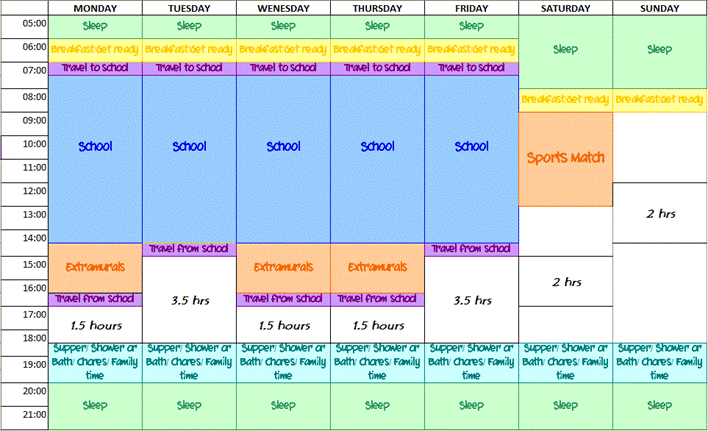Time management is an acquired skill
Time is the ultimate equaliser – it does not matter how old you are, how much money you have, what car you drive, where you live or whether you’re employed or unemployed – we are all given only 24 hours a day. It is how we use these 24 hours every day that sets us apart.
Time management is more than being punctual for appointments, it is about the focus required to complete our required activities in the available time by the intended date.
As adults, we often complain about not having enough time. Some of us have mastered time management - others, not so much. We tend to over-commit ourselves, underestimate how long activities will take, or get distracted from the task at hand. Poor time management can create stress and rushing through projects and tasks can result in unsatisfactory outcomes. Our consequences, as adults, could be missed deadlines leading to unhappy clients, managers or colleagues, and disciplinary procedures at work. Consequences for our children of rushed assignments, projects or study sessions are poor marks, educator disapproval, demerits or detentions. These can further lead to a reduction in confidence, relationship challenges with educators and a poor attitude.
Good time management is a habit, as is poor time management, and both are learned.
Time management is an essential skill that is learned – the sooner, the better. Children need to learn that they are responsible for how they spend their time. After all, responsible children grow into responsible adults. From Grade 4, time management becomes more important, as most children begin with cycle tests and/or exams in this year. As each year progresses, children’s time management skills are tested – sometimes to extremes. How do we teach our children to manage their time effectively when we sometimes struggle?
A few steps can be applied to make time management effective:
How much time do we have?
Most of our childrens’ time in a week day is spent sleeping, attending school and other routine tasks. Once this time is blocked out on a planner, we realise that they could only have 1-4 hours of time daily, for homework or studying and relaxing (Time for sleep and homework would be age dependant).
Example

In this example, this child has 15.5 hours available for homework and study per week. If more time is required, choices regarding extramurals or free time will have to be made to compensate for the shortage. At certain times of the year, more time may be required to revise or study for exams.
What needs to be done and by when?
- Children should work according to their daily school timetable with test or exam timetables available at the time. Encourage children to write their homework in a diary or planner to keep track of what is due and for when. Relying on memory is not always effective. Colour code timetables to match school books/subject folders so that less time is taken to find books/folders that are required, or colour code tasks by type like homework, projects, speeches and tests/exams.
- First start with what needs to be done for the next day. If there is time left, work on homework, projects, orals or activities that are due for later in the week or a future date.
- Encourage children to pack their school bags for the next day, according to their timetable, before they go to sleep. It can also be helpful if they get their school clothes ready, and pack their sports bag the night before. This removes tasks from the morning to-dos, reducing stress in the rush and children are less likely to leave books, tablets or projects at home, as they only have to pick up their bags as they are walking out of the door.
- Using a free page in a diary or planner, break up larger projects into smaller chunks – a project may require planning, research and materials before the project is put together and presented. Remember to include meetings for group projects. Estimate how much time each step would require, and also a date when each step would need to be completed by, in order to have the project completed in time. Studying for tests can be broken down into chapters or topics and the same method can be used to assign time allocations and deadlines to these. This method can also be used to set goals - make sure they are realistic, and break them up into smaller steps to achieve, add dates to each step, and revisit periodically to check that goals are on track and adjust accordingly.
- Fit these tasks into the available time allocated for homework/studying on a daily basis in the diary, planner or weekly schedule.

- If there is insufficient time available, make a decision regarding which activities/tasks/goals are not going to completed (reduce the number of activities that your child participates in or prioritise sports practice vs homework), or add additional hours of work over the weekend. Remember that the expectations of your child should be realistic.
- With younger children (Foundation Phase), parents may be given their child’s class teacher’s number and communication may be between the parent and the teacher to confirm homework details and due dates. As children get older (Grade 4 upwards), encourage them to ask their teacher for details on homework that they missed, or did not understand. Alternatively, they can get this information from their friends, but this may be less reliable. By the time they are in high school, children should be able to manage this process on their own.
Each child has their own pace, so be realistic. Spending 5 minutes on a maths problem, depending on the problem, can be reasonable. Spending 30 minutes on a maths problem is not reasonable, and could indicate that your child needs additional assistance to understand a concept. Likewise, expecting a child to complete 2 hours of homework in a day after extramurals that took up four hours after school is not viable. Free time is also essential.
Once a time management plan has been put in place, remember to keep adjusting according to the child’s pace – nothing is cast in stone. Things that consume time could have been omitted from the original plan. Some days, more time may be required for tasks than others. Things that are beyond yours or your child’s control do occur, that may create a deviation from the plan. Time is limited and irreversible – we cannot borrow from tomorrow, or carry over from yesterday. Therefore there is not much point crying over spilt milk – just learn from it, and change the plan to catch up. Strive for excellence rather than perfection*. If your child is unable to adjust their plan to manage the departure and catch up, offer assistance with the planning in order for them to get back on track. Remind them that anything can be achieved if they set aside the time, and have the drive and work ethic to attain it.
Remember to celebrate the victories, however small. You know when your child has put in extra effort to study, keep up, catch up or achieve a goal - acknowledge their efforts and praise their achievements. Recognition for their efforts will push them to achieve more.
Time management takes practice - the sooner they start with time management, the sooner they will become masters of their own time.
TOOLS FOR TIME MANAGEMENT
There are countless tools available for time management. You may need to explore a few strategies before finding one that works for your family.
Diaries & Wall Planners - A range of pre-printed A4 and A5 diaries and wall planners in different sizes to assist with managing time and tracking tasks.
Journals/Notebooks - Do you like the versatility of being able to format pages your own way? Then a notebook could be your answer
Info Boards (Felt Boards) - Available in Plastic and Aluminium Frames in various sizes. The Aluminium Frame is recommended for durability.
School Sorted Planner - The School Sorted Planner is specially designed to assist learners with keeping track of their homework, assignments, speeches, tests and exams. Detailed info on the School Sorted Planner can be found here.
Also available: Student Sorted Diary and Entrepreneur Sorted Diary
DIY planners - Search with Google for printable pages (subscription to websites may be necessary in order to download). We are not affiliated with any of these sites, and earn no income from any of them. Please use caution when visiting these sites.
Resources for this article:
http://afrilandproperties.com/time-management-skill-must-acquire/
https://www.appointmentplus.com/blog/why-time-management-is-important/
https://momdiary.co.za/product/student-sorted/
* Quote by H Jackson Brown Jr.

